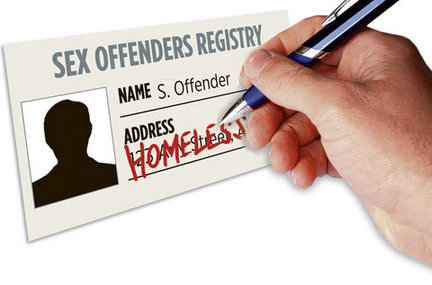
The chronic homeless have always been drug addicts, alcoholics or individuals with mental illnesses, most of whom also are abusing substances. But they are being joined by another category of men who are modern day lepers.
Sexual offenders are finding it impossible to obtain housing after they are released from jail or prison. Many states and municipalities have stringent rules about where registered sex offenders can live. As soon as they disclose their criminal background, landlords reject their applications. Sexual offenders end up being released to shelters where they are as unwelcome as they are anywhere else. They quickly disappear onto the streets.
This growing housing problem was brought to my attention during a recent board meeting of the Corporation for Supportive Housing, a national non-profit organization that Patti and I financially support. CSH helps cities and states build supportive housing units with wrap around services. It is the only organization whose board I serve on and it is at the tip of the spear when it comes to helping vulnerable populations, especially persons with mental illnesses.
Sexual offenders are not the only new wave on the streets. Children, who age out of foster care, and the elderly, who are indigent and often ill, also are swelling the homeless ranks.
It is easy to feel compassion toward homeless youths and older adults. It is difficult for many Americans to be concerned about sexual offenders, especially those who have preyed on children.
But not all registered sexual offenders have committed heinous crimes. You can end up on a sex offender registry if you are a minor and send a nude photo of yourself to a friend, get caught with a prostitute or flash your breasts in public if you are a female.
Persons with mental illnesses end up being identified as sexual offenders after they are arrested for urinating in public (that is illegal in 13 states) or being naked in public.
I recently received a letter from parents of an adult son who was diagnosed with bipolar disorder and was arrested after he engaged in an email exchange with an undercover officer posing as an underage teen. His parents insist their son was lonely, socially awkward, and was entrapped.
Twenty states and the District of Columbia use mental health involuntary commitment statutes to keep prisoners locked-up after they complete their prison terms. The states simply move these convicts from a prison to a “mental hospital” by declaring them a “sexual predator” and a danger to others. In three separate cases, the U.S. Supreme Court has ruled that it is constitutional to hold these offenders indefinitely.
An attorney friend of mine contacted me recently about a client who had written her from the Virginia Center for Behavioral Rehabilitation, a so-called treatment facility for men identified as sexual predators who pose a significant risk for sexually reoffending.
The client insisted that he was no longer dangerous and had served his time for committing incest with his underage step-daughter but no state official wanted to risk freeing him. He sang the same song that state mental patients used to sing. He was told that if he did X, Y, and Z, he would be cured and released, only to discover that after he successfully completed X, Y, and Z new demands were made.
There are some who argue that identifying sexual offenders as individuals with mental illnesses contributes to stigma and operating “mental hospitals” for them drains away tax dollars that could be better spent on the seriously mentally ill. Others argue there is no known cure for sexual deviancy, therefore facilities such as the VCBR should be called prisons not mental health units.
I doubt many will care that sexual offenders can’t find housing. But ignoring this growing issue will only result in these individuals vanishing on our streets and presumably increase the chances of them ending-up back in trouble.



